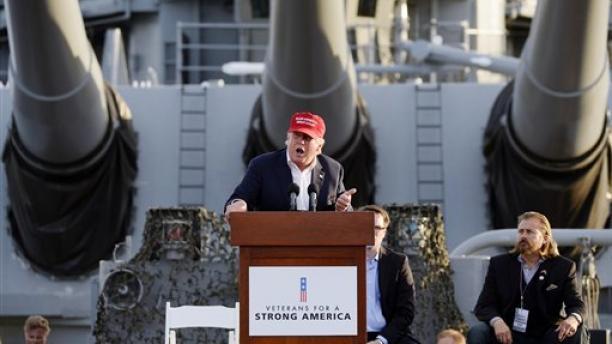
Republican presidential nominee Donald Trump speaking at a campaign event aboard the USS Iowa battleship last year. (Associated Press)
“In the 20th Century, the United States defeated Fascism, Nazism, and Communism. Now, a different threat challenges our world: Radical Islamic Terrorism.” And so began Republican presidential nominee Donald Trump’s much anticipated foreign policy speech earlier this week.
This was a speech that left no doubt about how Trump sees the international security landscape and how he plans to snatch the American people to safety away from the claws of radical Islamic terror. But, Trump’s over-simplistic diagnosis of the threat to America specifically, and the world in general, is off the mark, and so is his prescription. Here’s why:
Deadly attacks within the heart of Europe are becoming more common and refugees fleeing a regional war have started to stretch to their limits political and social tolerance for immigrants. To make this point, Trump angrily stated that, “there has been an ISIS attack launched outside the war zones of the Middle East every 84 hours.” He double downed on his theme of an America under siege by listing some of the more recent terror attacks on American soil (with the notable exception of the September 11, 2001 attacks—events that occurred under a Republican president’s watch).
Without doubt, Trump’s bias towards Islamic terror as America’s preeminent national security threat reflects Americans growing preoccupation with a menace perceived to be spring-loaded to strike American soil at any time. This fear is legitimate; however, Trump’s proposed approach for dealing with “terror” specifically won’t be effective since its underlying fundamentals are wrong.
Insinuating that radical Islamic terrorism is both source and symptom of America’s national security problem; the epitome of all that is wrong in the world, illustrates Trump’s anemic understanding of the forces pulling Middle Eastern security apart at its seams. However, it is this worldview that legitimizes—in his mind—a slew of policy proposals (to include, “an ideological screening test”) which he promises to enact should he be inaugurated president next January.
Perhaps Mr. Trump should heed the words of seasoned U.S. national security leaders like the current Director of National Intelligence, James Clapper who stated in a 2011 interview that “the United States no longer faces—as in the Cold War—one dominant threat. Rather, it is the multiplicity and interconnectedness of potential threats.”
Sadly, Trump’s understanding of the “problem” meshes with a longstanding U.S. national security practice that has repeatedly proven its inadequacy to frame, track and resolve threats that don’t behave like the conventional threats Americans are used to managing. Failed states, millions of at-risk-youths living within the sphere of radical Islam, and environmental variability are just a few of the underreported forces that are converging with devastating impact across the world. Trump has yet to discuss how he would lead the world in addressing these mega-trends.
Trump does not see the big picture and has no credible plan other than rapidly fortressing America (e.g. building walls and “aggressive screening”) and applying more hard power to achieve security goals. A more visionary national security approach would have discussed how one can more effectively balance and deploy America’s “Three Ds” (i.e. Defense, Diplomacy and Development) in concert with regional and international partners to address the root causes of growing instability across the world’s hotspots.
Unfortunately, this is not the prescription Trump supporters want to hear; but it’s the only prescription any serious candidate should be prescribing, but then, is Trump a serious candidate.